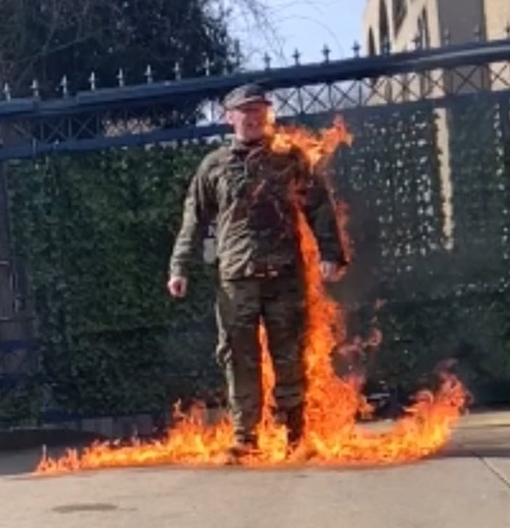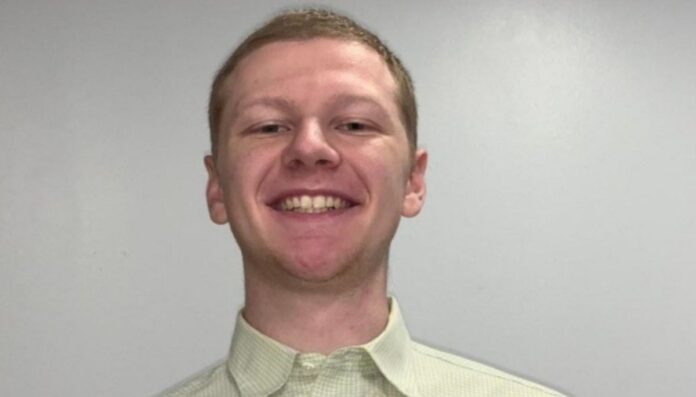The public incident report disclosed by the Metropolitan Police Department reveals that Bushnell showed symptoms of mental distress, fueling discussions about his death concerning mental health matters.
Born in 1998, Aaron Bushnell, a 25-year-old member of the United States Air Force, immolated himself outside the Israeli Embassy in Washington DC, protesting against the war in Gaza.
Bushnell commenced his service with the United States Air Force (USAF) in May 2020, where he completed Basic & Technical Training.

He then assumed the position of a USAF DevOps engineer in San Antonio balancing his commitments with an undergraduate degree in computer software engineering and a CompTIA Security+ certification from Southern New Hampshire University.
Described by his peers as the “kindest, gentlest, silliest little kid,” he was committed to achieving “liberation for all with a smile on his face.”
Also Check Out: Kris Aquino Illness & Health Update 2024: Is She Sick?
Aaron Bushnell Mental Health Leading To His Death
The incident surrounding Aaron Bushnell’s self-immolation on February 25, 2024, outside the Embassy of Israel in Washington, D.C., sent shockwaves throughout the nation.
At approximately 12:58 p.m. local time, he approached the Israeli Embassy in Washington, D.C., with the intent to engage in an extreme act of protest against the Israel–Hamas war by self-immolation.
Before this tragic incident, he had created a will in which he left specific instructions, including the arrangement for his cat to be taken care of by a neighbor after his death.

Moreover, he had also sent a message to media outlets before the planned self-immolation, explicitly stating:
Today, I am planning to engage in an extreme act of protest against the genocide of the Palestinian people.
The tragic event, captured in a public incident report by the Metropolitan Police Department, described Bushnell’s distressing act of dousing himself with an unidentified liquid and setting himself ablaze before the intervention of the Secret Service.
The media widely reported Bushnell’s self-immolation, triggering diverse reactions from the public. While some hailed him as a hero and a martyr, others branded him as a terrorist and a lunatic.
Some perceived him as a victim of mental illness and a flawed system, while others viewed him as a perpetrator of violence and a destabilizing force.
His sudden and unexpected action prompted soul-searching conversations about the state of mental health care, particularly within military circles.
Drawing attention to his action as a possible indicator of a mental health crisis underscores the importance of comprehensive medical and psychological assessments to avoid drawing misleading and potentially harmful conclusions.
Doubts about the effectiveness of mental health care for service members arise as investigations into Bushnell’s actions carry on.
Throughout his military career, Bushnell maintained a reputation as a model of physical health and mental toughness, showcasing the disciplined and resilient qualities commonly found in military personnel.
Details Explained About The Cause of His Death
In the act of self-immolation, Bushnell expressed his protest against “the plight of the Palestinian people under their colonizers” and declared his refusal to “remain complicit in genocide” before setting himself on fire.
Pouring gasoline over himself, he yelled “Free Palestine!” as flames consumed him until he dropped to the ground. Throughout the incident, he remained in his service uniform.
Broadcasting live on his Twitch account “LillyAnarKitty,” he set up his camera outside the embassy gates and positioned himself in front of them.

Following the ignition of his body, he was rushed to a nearby hospital in critical condition. The Washington D.C. police verified Bushnell’s demise on the same day.
As per the report, Bushnell’s death was documented at 10:06 p.m. on Sunday, with his burn injuries cited as the cause of demise.
You Might Be Interested In Katt Williams Mental Health: Is He Okay? Health & Illness Update

